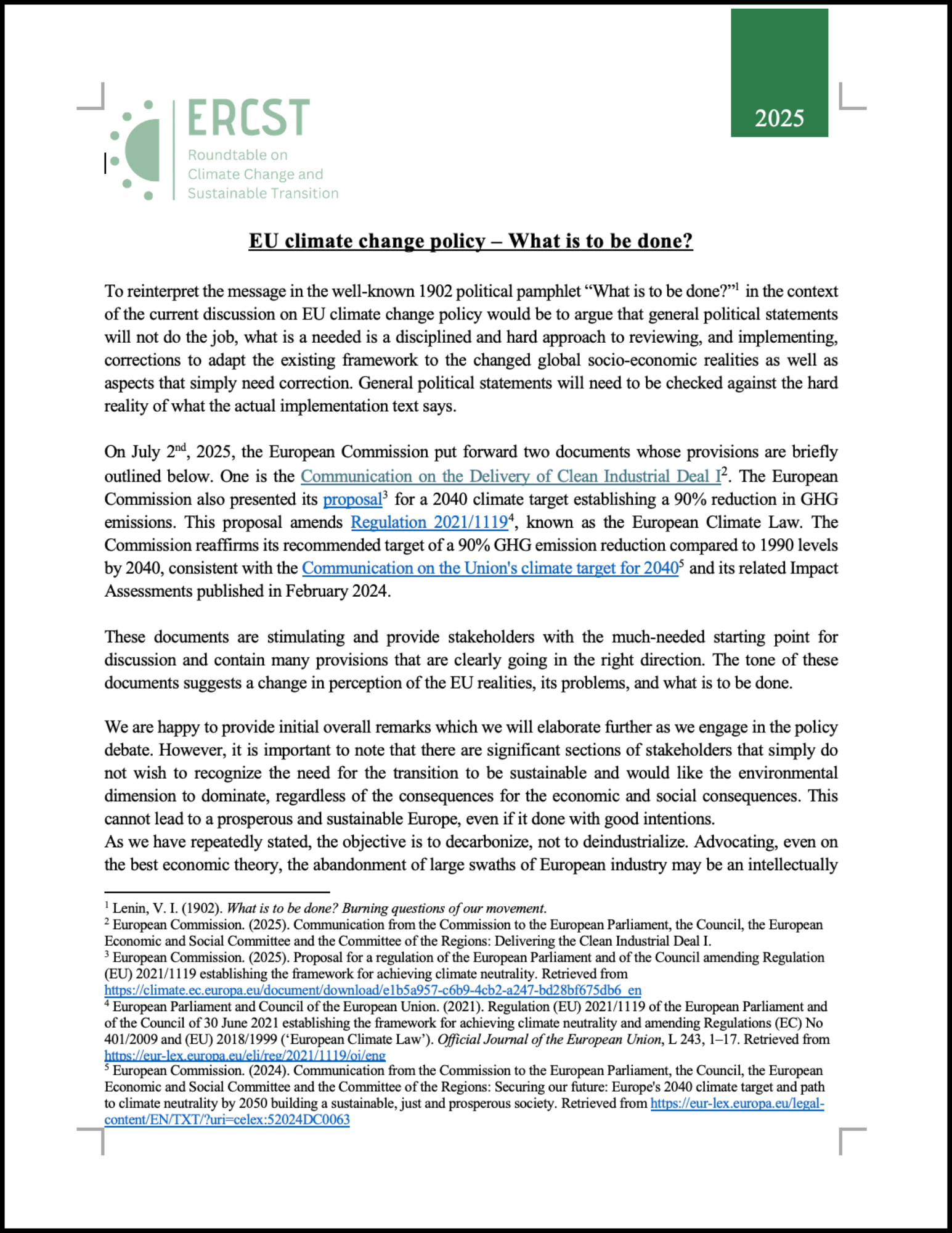CCUS in the net-zero transition
To achieve the goal of the Paris Agreement of pursuing efforts to limit the temperature increase to 1.5°C above pre-industrial levels, countries must severely reduce their emissions and reach a […]
To achieve the goal of the Paris Agreement of pursuing efforts to limit the temperature increase to 1.5°C above pre-industrial levels, countries must severely reduce their emissions and reach a […]
In December 2022, the European institutions reached a provisional agreement in the CBAM trilogues. The transitional phase of the Carbon Border Adjustment Mechanism started in October 2023, with actual implementation starting from 2026. In this roundtable, we discussed the function of the CBAM in a portfolio of instruments for industrial decarbonisation, focusing on the role of […]
During this meeting, ERCST intended to present the results of a research exercise on developing a climate change lens to analyse and inform the EU debate on reforming the electricity market design and on the discussions held during private ERCST working group consultations in January and February. This meeting started with a presentation by ERCST’s […]
ERCST's Executive Director, Andrei Marcu, moderated the Deep Dive session Carbon Border Adjustment Mechanism: A New Era for Global Trade Order, which is part of IETA's European Climate Summit in Lisbon. Climate, trade and competitiveness is reaching a fever pitch across the Atlantic. The long-debated CBAM is set to become a reality. This session looked at […]
This workstream consists of a continuous series of meetings and accompanying publications which aim to bring together different stakeholders to take stock of key policy and regulatory developments of the EU hydrogen policy and regulatory framework identified by ERCST. It also aims to put forward recommendations and propose innovative solutions to existing policy and regulatory […]
To achieve the goal of the Paris Agreement of pursuing efforts to limit the temperature increase to 1.5°C above pre-industrial levels, countries must severely reduce their emissions and reach a net zero economy by 2050. In this framework, carbon capture, utilisation, and storage (CCUS) technology is necessary to achieve ambitious climate targets. However, its deployment […]
This was the launch event of the 2023 State of the EU ETS Report1. During this event the report was presented by the authors and discussed by commentators. This was be the eighth annual report on the State of the EU ETS and builds on the reports produced by this group of authors, and other […]
The objective of the ERCST project is to analyze the current pathways emerging from EU policy for decarbonisation of heavy-duty road transportation and propose, if necessary and appropriate, complementary and/or alternative policy pathways. They will be underpinned by the EU objective of climate neutrality stemming from the EU Climate Law. The EU Sustainable and Smart […]
The EU ETS and CBAM are key drivers to achieve industrial decarbonization and secure a prosperous and industrial EU, but they must be accompanied by flanking measures to be effective in a context where they must face other decarbonisation approaches such as the Inflation Reduction Act (IRA) in the US and significant subsidies for green […]
The ERCST workstream on “EU Climate Policy and Electricity Market” provides analytical input on the interactions between EU climate policy and electricity market. Within the scope of the first part of this project (1st quarter of 2023), the ERCST team has developed a framework matrix (Annex 1) for analysing the elements of the EC proposal on electricity […]
This event was selected as a workshop within Innovative4Climate (I4C) 2023, the World Bank Group's annual global conference on climate finance, carbon markets and investment. The full programme is available here. To achieve the goal of the Paris Agreement, countries must drastically reduce their emissions and achieve a net-zero economy by 2050. Although carbon removals […]
This was an in-person meeting. During the previous ERCST hydrogen roundtable discussion, the different pieces of the EU H2 policy and regulatory framework were assessed, focusing on its readiness and capacity to adapt to different ambition levels. The discussion was also intended to explore if the framework has been completed or whether there are still […]

